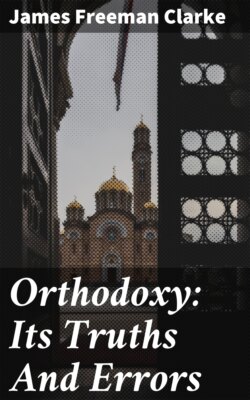Читать книгу Orthodoxy: Its Truths And Errors - James Freeman Clarke - Страница 33
На сайте Литреса книга снята с продажи.
§ 4. Criticism on these Different Views of Miracles.
ОглавлениеTable of Contents
In attempting to discover the truths and errors contained in these statements it is a great satisfaction to feel that our faith in Christ and Christianity is not depending on them. If we believed with those who consider miracles the only or the principal proof of Christianity, we could hardly hope to be candid and just in examining the arguments of those who deny the marvellous facts of the New Testament. There is no doubt that the number of religious and Christian men who have relinquished all belief in the marvellous part of the Bible has largely increased within a few years. At the present time there is a strong tendency to disbelieve and [pg 067] deny all miracles as incredible and impossible. Renan, in his “Life of Jesus,” says, “Miracles never happen except among people disposed to believe them. We banish miracles from history in the name of a constant experience. No miracle has, as yet, been proved.” Renan adds, that “if a commission of men of science should decide that a man had been raised from the dead he would believe it.” “Till then,” he says, “it is the duty of the historian not to admit a supernatural fact, but to find, if he can, what part credulity and imposition have had in it.” Accordingly, Renan writes his “Life of Jesus” in this sense, discarding most of the miracles, or explaining them away, and trying to put together into some kind of shape the fragments which remain. But Renan does not go far enough to satisfy some others. Gerritt Smith, for example, in a recent lecture which he has published, called “Be Natural,” says, “Jesus neither performed nor attempted to perform miracles. His wisdom and sincerity forbid the supposition. Am I an unbeliever in the historical Jesus because I hold him innocent of the absurdities which superstition and folly tax him with? No more than I should disbelieve in Shakespeare, by denying that he walked on the Avon, or changed its waters into wine. M. Renan ought to have made no account of these stories of miracles. He should have dropped them entirely, as did Rammohun Roy in his Hindoo translation of the New Testament. Let the credulous feed on these creations of superstition, but let men of sense turn away from them.”
The reason why so many intelligent men find it impossible to believe the miracles of the New Testament, while they find it very easy to believe the religious and moral teaching of Jesus is partly due to the spirit of the age. The intellect of this age is more and more scientific. Now, science is the knowledge of facts and laws. A miracle is opposed to all usual observation of facts, and is often called by theologians a violation of the laws of nature. It is not therefore strange [pg 068] that men imbued with the spirit of science should dislike the notion of miracles.
